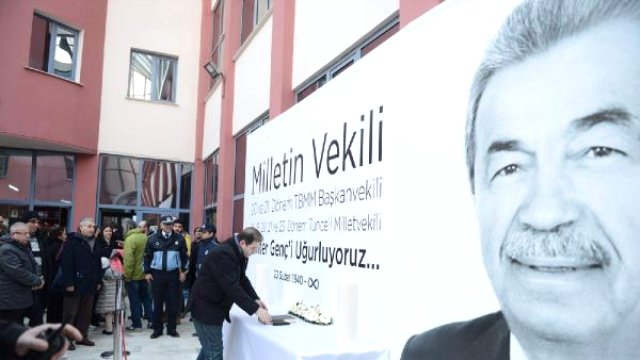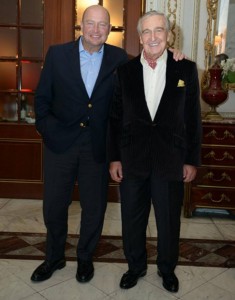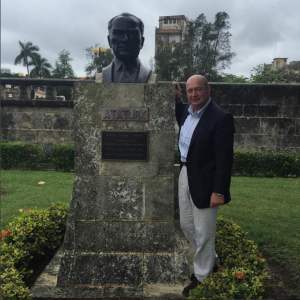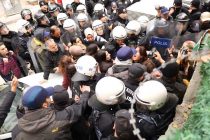Turkey’s top politicians, business leaders and many other notables were out on Sunday to bid farewell to two of Turkey’s leading personalities: Mustafa Koç from the world of business and former deputy Speaker of Parliament Kamer Genç.
On Thursday, 21 Jan, Mustafa Koç, the chairman of Koç Holding, passed away aged 55 following a heart attack. He was laid to rest next to his grandfather Vehbi Koç in a family plot in Istanbul’s Zincirlikuyu cemetery following funeral prayers at the Marmara University Theology Faculty Mosque – the site where his company annually holds iftar (fast-breaking) dinners for Muslims during Ramazan. President Recep Tayyip Erdoğan, Prime Minister Ahmet Davutoğlu and CHP leader Kemal Kılıçdaroğlu were among the mourners.
The day after Turkey was rocked by the sudden death of Mustafa Koç, the country also lost Kamer Genç. The veteran politician, known for his candid and colourful views, died after a long battle against pancreatic cancer and was buried in his home town of Tunceli, in eastern Turkey, on Monday. A service was held in his honour at Kartal Cemevi in Istanbul on Sunday, with CHP leader Kılıçdaroğlu, former Parliament Speaker Hüsamettin Cindoruk, former Culture Minister Namık Kemal Zeybek and İzzettin Doğan, the head of Turkey’s Cem Foundation, among those present to pay their respects to the well-loved politician.
Kamer Genç, 1940 – 2016
Of Zaza heritage Genç was born on 23 Feb. 1940 to a poor Alevi family in Ramazanköy, a village in Nazımiye in Tunceli. A bright student, he won a scholarship to his high school and went on to graduate from the Ankara Financial and Commercial Science Academy (now the Economic and Managerial Sciences Faculty at Gazi University) in 1966. He took up an internship with the Ministry of Finance and was subsequently appointed as a Tax Officer in nearby Bingöl.
He spent two years in Paris between 1974 and 76. He returned to Turkey and served in the Council of State, scrutinising the public sector finances and, where required, prosecuting any civil servants who had misused state funds.
Following the military coup of 1980, Genç decided to enter politics. His application to stand as an independent candidate in Tunceli was initially turned down in 1983, but he succeeded a few years later and was first elected as an MP to Parliament in 1987.

Genç went on to serve as a deputy for a total of six terms. Of these, he stood as a Tunceli MP for CHP for two terms. He also served as a deputy for the Social Democratic People’s Party (SHP) and the True Path Party (DYP). He failed to enter Parliament in 2002 when DYP failed to secure enough votes to cross the electoral threshold. However, Genç was re-elected in 2007 and again in 2011, serving until the General Elections of 2015. During his time as an MP, he also served as the Deputy Speaker of Parliament for the 20th (1996-1999) and 21st (1999-2002) sessions.
A man of the people, sincere yet stubborn, he was known as much for his integrity as for his outspoken views Genç gained huge respect from the Turkish public in his later years as he was a constant thorn in AKP’s side, regularly challenging them over their attempt to change the secular nature of Turkey, their lack of transparency and the many corruption allegations that have plagued the party since 2013. Such was his Genç’s fierce opposition that some Turkish commentators dubbed him “Turkey’s Biggest Opposition Party”. He was also known for his comical gaffes in Parliament, which further endeared him to the nation.
Even though her wealthy father was reluctant to give his daughter away to the son of a pauper, Genç married his childhood sweetheart Sevim in 1967. She and their two children, Seçkin and Seçil, was at his bedside at Gayrettepe Florence Nightingale Hospital when he passed away on 22 Jan.
Mustafa Koç, 1960 – 2016
Twenty years his junior, Mustafa Koç’s start in life couldn’t have been more different to Kamer Genç. He was born into one of Turkey’s wealthiest families, the eldest of Rahmi and Çiğdem Koç’s three sons.

His mother left the family home to be with another businessman, Haldun Simavi, when he was aged 11. Soon after, Mustafa Koç was sent to study at a private high school in Switzerland, learning English and German in the process. He went on to the George Washington University School of Business, graduating in 1984. He returned to Istanbul where he started to work in the family business, initially as a manager in the sales division at Tofaş cars.
Over the following period eight years, he served in different roles across the family’s diverse business portfolio before being made vice-president of Koç Holding in 1992. Four years later, he was appointed CEO and in 2003, he took over as chairman when his father Rahmi retired.

Koç Holding currently owns 113 companies that operate in the automotive sector, white goods, food, retailing, energy, financial services, tourism, construction and IT industries. In 2014, the group posted $31.3 bn in sales, amounting to 8 percent of Turkey’s GDP. The conglomerate has 85,000 employees and its manufactured goods account for 9% of Turkey’s exports. It is listed as the 341st largest company in the world by Fortune magazine Global – the only Turkish company on the Fortune 500 list.
According to Bloomberg, Mustafa Koç’s term as chairman saw landmark deals to expand the group, including the takeover of 51 percent of Tüpraş (Turkey’s only crude-oil refinery) from the government for $4.1 billion in 2005. He also bought 57 percent of lender Yapı Kredi Bankası AS from Çukurova Holding AS for $1.5 billion, a deal it undertook in partnership with Italy’s Unicredit SpA in 2004.
In a statement Bill Ford, executive chairman of Ford Motor Co., paid tribute to Turkey’s leading businessman: “Mustafa was an outstanding business leader, a man of true integrity and a loyal friend and partner to Ford over many decades.” Ford and Koç Holding have been partners for more than 80 years in motor-vehicle production in Turkey.

Bülent Eczacıbaşı, chairman of Eczacıbaşı Holding AS and a close friend of Mustafa Koç and his family, said: “His passing away is a big loss not only for his family and the Koç Group, but also for our business community and our country.”
Mustafa Koç was not only a business pioneer, but also known for his philanthropic support of the Arts, as well as many cultural and social projects. He also championed gender equality and was due to speak on the issue at a high profile forum in Davos during the week of his death.
The billionaire businessman endeared himself to the public when, during the Gezi Riots in 2013, he and his brother Ali allowed injured people to take refuge in the family-owned Divan Hotel located in Taksim, where they were also treated for their injuries. His actions incurred the wrath of the ruling AKP Party, who cancelled various government defence contracts with Koç.
In 1992, he married Caroline Giraud, the daughter of a wealthy family from Izmir. They have two daughters, Esra and Aylin. Mustafa Koç was also a passionate golfer and supporter of Fenerbahçe Football Club.





